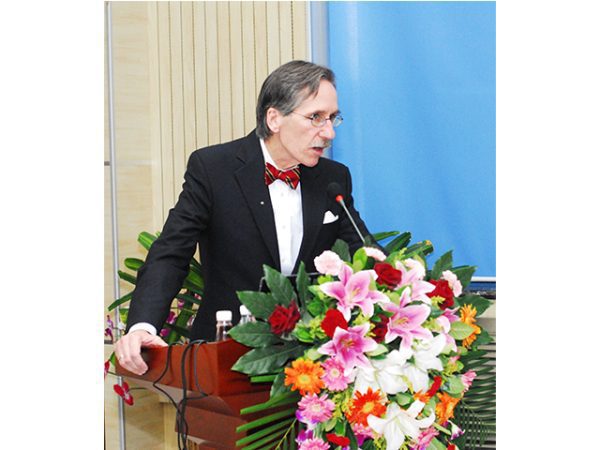CHHS Distinguished Professor Working to Bridge University Research and Community Engagement

“Every individual is attached to a community, a place that socially determines their health. The place where you are born, where you live and grow, determines the quality of your life and the number of years you will live,” says Mark DeHaven, PhD, the recently appointed Colvard Distinguished Professor in UNC Charlotte’s College of Health and Human Services (CHHS).
As part of his new role at the University, DeHaven has taken the lead in establishing the CHHS Academy for Research on Community Health, Engagement, and Services (ARCHES), which brings teams of multi-disciplinary UNC Charlotte faculty together to develop active partnerships with community health and human service agencies, as well as local and state government. The goal: to help improve health outcomes and quality of life, and reduce health disparities, especially among traditionally vulnerable populations.
In this position, DeHaven plays a key role in supporting the College’s vision of becoming the central research and public service force in addressing health issues in the greater Charlotte region and in the state of North Carolina. Coming from The University of Texas Southwestern Medical Center at Dallas, DeHaven has a long history leading multi-disciplinary teams that focus on prevention and access to quality healthcare. Working here in the U.S. and globally — in countries such as Mexico, Peru, China, and South Sudan – he has supervised and directed dozens of community health initiatives related to chronic disease reduction efforts. In fact, his work has already begun to yield promising findings as it relates to preventing and reducing cardiovascular disease and diabetes risks. His accomplishments have been illustrated through his vast record in research, grantsmanship, mentorship and publication.
Here at UNC Charlotte, DeHaven and other ARCHES faculty members have begun working to build and strengthen relationships with key stakeholders in the local community. One of their biggest goals is to garner a greater understanding of the broader community health priorities and then work in tandem to develop programs and interventions that facilitate healthy living. “By working cooperatively and actively engaging with community members, the ARCHES will develop and implement cutting edge and empirically proven comprehensive plans to raise the level of health and well-being of individuals and families,” says DeHaven.
Part of his model, commonly referred to as community-based participatory research, involves partnering directly with the community to establish a dialogue around the cause of disease and other health challenges – doing so mainly through spending time listening to the needs of the community – and then working collaboratively to design solutions. DeHaven strongly believes that this “holistic” approach will help to drive solutions that are prevention based as opposed to treatment based. “Most U.S. doctor’s operate from the medical model concerned with treating disease and using medicine to do so,” he says. “While medical doctors ask patients about their disease, we take a different approach: Tell me about the person who has the disease.” The group, he says, will work to address everything from environment — including access to healthy foods and safe spaces — to spirituality, financial support, and education. DeHaven says the success of this community health approach hinges on combining the best clinical science, with collective responsibility and informed social action.
The ARCHES is part of a larger vision of the Dean of the College of Health and Human Services. “It is truly an exciting time for our College. As our community continues to evolve so has our way of viewing health issues and how we address them.” says Dean Nancy Fey-Yensan, PhD, RD. “I am proud to see our faculty embracing cutting-edge approaches to tackling challenges as they relate to nursing, social work, public health sciences and kinesiology. With his vast experience and leadership style, Dr. DeHaven is not only positioning our College for the future but helping to increase our individual faculty members’ visibility while strengthening and expanding our community health research capacity as a whole.”